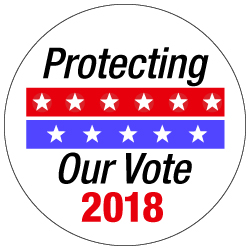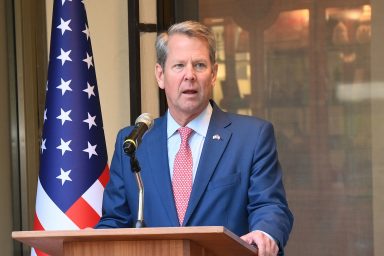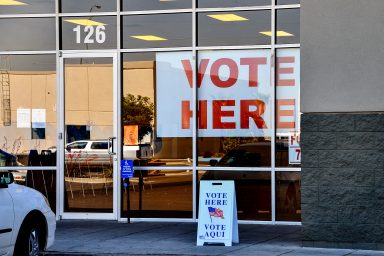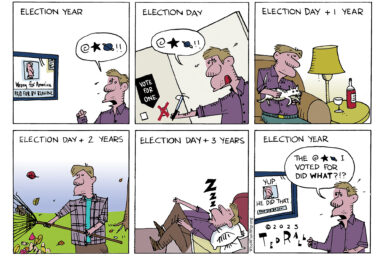With so much energy expended — and money spent — to restrict access to the ballot box, what’s it like to have to fight for one of the pillars of democracy?
Tomorrow, as Americans head to the polls, they face a potentially trying experience.
In many states, voters will cast a ballot on a paperless machine. Voters in 33 states will present identification to vote. Hundreds of thousands of voters may show up to vote only to find out that their registrations have been purged or challenged out of legitimacy. Election workers will only dish out ballots in English to people with the right to vote in their native tongue. Some voters may well find that the last polling site they visited has been relocated or shuttered entirely.
But as threats of foreign interference flit across the airwaves, politicians retrench restrictive policies, and election administrators balance stressed budgets with deficient resources, activists organize for a different future. Countless local groups register and educate voters. Advocates file lawsuits.
The fight between the defenders of democracy and its enemies is hardly fair. Those who want to limit the right to vote to their own supporters as much as possible are powerful, well-funded, and come up with new ways to achieve their goals all the time.
Their opposition, the everyday people who want all eligible Americans to be able to vote, have few resources apart from their passion of knowing that they are doing the right thing. In conversations with experts and advocates, WhoWhatWhy sought to understand the experiences of those who are, in an ever-more-grim context, carrying out this work.
“It’s tiring,” Stevie Valles the executive director of Chicago Votes told WhoWhatWhy. “It makes no sense for anyone to do the amount of work each of us [is] individually doing. Organizers, lawyers, and academics echoed the sentiment.
“It’s frustrating in some ways,” said Katie Fahey of Voters Not Politicians, the Michigan organization pushing for an independent redistricting commission. “Is this what my taxpayers pay the politicians to do?”
“Well, it’s frustrating…” said Larry Norden, deputy director of the Democracy Program of the Brennan Center for Justice. “Change is hard. We have to show people that the system works and is worth it.”
“I want action now. I want to see people like [Kansas Secretary of State] Kris Kobach stopped in their tracks,” Secretary of State of Maine Matthew Dunlap told WhoWhatWhy. “How do I do that? That’s not an easy answer — but it gets into the simple theory that your vote matters.”
Integral to that work — whether in the courtroom or on the streets — is focusing on what can be changed to open up the electoral process and build alternatives to the national landscape at a local level.

The news cycle reinforces the frustration. On the first day of early voting in Tennessee, machines experienced unanticipated difficulties that produced long lines. A week later the NAACP filed a lawsuit against the local election commission, citing its failure to process tens of thousands of last-minute voter registration applications.
North Dakota officials preach the imperative to reinforce voter identification laws that could prevent many Native American people from casting a ballot. North Carolina moved to shutter yet more polling places. The list grows ever longer and the cause for frustration more acute.
Then there is Georgia, where Secretary of State Brian Kemp is administering an election in which he is running for governor. Activists and advocacy groups have exposed dishonest public discourse about voting machines, voter purges, and calculated polling place closures.
“You talk about the building blocks of democracy and how we run our elections,” said Secretary Dunlap. “The seedy underbelly of getting out the vote really means getting out my vote, not your vote. That leads to people getting a little bit carried away.”
Voter suppression has a long history in the United States. “The millions of votes and voters that disappeared behind a firewall of hate and partisan politics was a long time in the making,” writes Carol Anderson in her new book One Person, No Vote. She documents contemporary and historical efforts to keep black people from casting a ballot.
Much of the recent turmoil traces back to 2013 when the Supreme Court repealed key provisions of the Voting Rights Act in the Shelby County v. Holder case. That decision returned much of the decision making power back to the states. It overturned a preclearance requirement that had meant states with particularly egregious histories of voter suppression had to gain approval from the federal government prior to changing election law.
Paired with the embrace of money in politics that the Citizens United v. FEC decision dealt, elections unfold in a context riddled by conflict and contradiction.

“For some 40 years now, the Supreme Court has been issuing decisions that make it difficult to regulate [money in politics],” Chiraag Bains, director of legal strategies at Demos, told WhoWhatWhy. “Citizens United is the crowning achievement of that effort.”
He wouldn’t be terribly surprised to see the Supreme Court — especially with the confirmation of Justice Brett Kavanaugh, who Bains called “deferential” to the rights of corporations and individuals to spend on campaigns — upend the few remaining protections, among them laws that impose certain contribution limits and require disclosure in many circumstances.
And regardless, the Federal Election Commission’s lax enforcement of the meager campaign finance laws that still exist means hundreds of thousands of dollars spent to control and shape the political process. The ramifications are potent — and the fallout continues to amplify.
“People feel like laws are being passed in defiance of popular opinion,” Fahey, of Voters Not Politicians, said. “When my friends and family go to vote, they feel like it doesn’t matter.” She hopes to change that through Prop. 2 — a ballot measure that could change how Michigan draws its congressional district map.
Rather than relying on a group of politicians with vested interests, an independent commission would assume responsibility for drawing district lines. As it stands, the politicians who draw maps work from a negligible legal framework for what constitutes a fair district.
Miller v. Johnson rendered racial gerrymandering illegal, but no court case has done the same for the kind of partisan gerrymandering that plagues many states. The Supreme Court had an opportunity in its June 2018 session when it decided Gill v. Whitford. That case addressed partisan gerrymandering in Wisconsin. Many hoped the Supreme Court might issue a decision that would clarify a legal framework for partisan gerrymandering. Instead, the bench punted and sent the case back to the lower courts for further review.
While troublesome, Fahey hasn’t let that decision interfere with her work at Voters Not Politicians. Michigan is one of a handful of states that allows for citizen-led ballot measures like Prop. 2. Where the federal court system shies away from the issue, Fahey sees an opportunity for regular people to advocate on a state and local level.
“What you can do on the state level is make it illegal,” she said. “There is nothing defending the right of gerrymandering.”

Fahey’s friends and family are far from unique. Confidence in elections simmers at low levels nationwide.
“People are not enthusiastic about most of our institutions,” said Dr. Lee Miringoff, professor of political science at Marist College, which conducted a poll about voter confidence with NPR earlier this fall. “The election system is not going to be immune from that.”
The threat of foreign interference preoccupies many voters — and has drawn focus and attention to the feeble state of election infrastructure. “As disturbing as they are,” Norden said, “the Russian attacks on our election infrastructure really jump-started efforts to better fund our elections and to take steps to ensure that on Election Day we’re making sure that people can vote.”
Nor does Russian meddling present the most visceral or obvious threat to democracy for many voters faced with homegrown attempts to keep them from the ballot box. The NPR/Marist poll that Dr. Miringoff worked on followed an incendiary report from the US Commission on Civil Rights that demonstrated the racial inequity in civic participation.
“There are some forces that have an interest in ensuring low voter turnout,” Bains said. They do have an interest in voter suppression, keeping people from the polls, and making people believe that their vote doesn’t matter.”
The conversation about election issues, though, continues to focus on meddling, interference, and hacking. And despite more awareness about the weakness and vulnerability of election infrastructure, little has changed since the 2016 elections.

Infrastructure remains vastly insufficient. “It is astounding and a dereliction of duty that the Republican Senate or House has not done a more effective job leading on this,” Liz Kennedy, senior director of government and democratic reform at the Center for American Progress told WhoWhatWhy.
Thanks to that recalcitrance, states and localities struggle to fund efforts to upgrade voting equipment. Nowhere has a state’s allocation from the $380 million dollars that Congress appropriated to address critical election infrastructure problems proven sufficient.
The available equipment options themselves present a host of issues. Where election administration remains decentralized, a handful of profitable companies control the business of voting. Three election equipment vendors provide the vast majority of machines nationwide.
They operate with near-free reign: they sell proprietary software and hardware without much public oversight. “We regulate ballpoint pens more than we do the election system industry,” Norden said. “That’s kind of amazing.”
But election infrastructure isn’t the most appealing of problems for public officials to solve. Few people pay it much mind — until it fails. Because it takes time and costs money that states don’t have set aside, addressing election infrastructure isn’t like fixing roads, investing in public transportation, or building schools. “People don’t necessarily see it,” Norden said.
Tying politics and civic engagement to the issues that people do see forms the backbone of Valles’s work at Chicago Votes. Like many advocates, where federal oversight and investment falter, he focuses on local issues and tools his efforts to have a local impact. He learned community organizing on the Obama campaign in 2008. A local approach to civic engagement drives his work as the executive director of Chicago Votes.
Much as critics of corporate money in politics argue for a decentralized, locally-driven approach to fundraising, Valles works to bring political language and issues off a national platform and onto the streets of Chicago.
“Jumping straight from ‘hey are you registered to vote’ to ‘the Census matters,’” Valles said, “It’s a pretty lofty leap in terms of engaging young people.”

Talking to young people about removed issues like gerrymandering and voter access won’t necessarily serve as political motivation, he’s found. Instead, the organization he runs works to speak to young people about the issues they care most about in familiar and accessible contexts.
“The first time we’ve talked about politics in general is when we touch them in the community,” he said. Valles is a strong believer in the power of numbers: while the elected officials and actors working to restrict access to the ballot box may have deeper pockets than his nonprofit, “[We engage] people in civics from a cultural perspective that is relevant to their lived experiences.”
On the-ground organizers like Valles and Fahey keep the people who work at think tanks and legal advocacy organizations going. Given the improbability of national action — in the judicial or legislative branches — advocates like Norden, Bains, and Kennedy see enormous potential in building and test-driving alternatives at a local level.

That doesn’t override the need for federal protections of civil rights and fair elections. “You do need oversight laws from the federal government to help provide that and to protect the people, to protect the integrity of representative democracy,” Fahey said.
She would love to see federal action on partisan gerrymandering, but in the current climate, she sees how advocacy for change at the state and city levels present a more practical, actionable avenue.
“We are not going to get where we need to get through litigation alone,” Bains of Demos said. “We do need to put forward a policy vision of expanded voter participation.”
Several existing and proposed programs stand out — especially efforts to register the millions of eligible voters absent from the rolls. Many states have implemented automatic and same-day voter registration.
Expanding the franchise to people with past felony convictions could activate millions of voters. Floridians will vote on a constitutional amendment that would do just that next week. Michiganders, alongside voters in five other states, will decide whether or not to adopt independent redistricting commissions.
Advocates will keep filing lawsuits while organizers knock on doors.
“When you look at the people who have power, when you look at who the people who have power actually listen to,” Valles said, “By all intents and purposes it doesn’t seem like we have a fighting chance to shape politics and shape the voting system to be what we want it to be. But the reality is we do because we have more of the people.”



